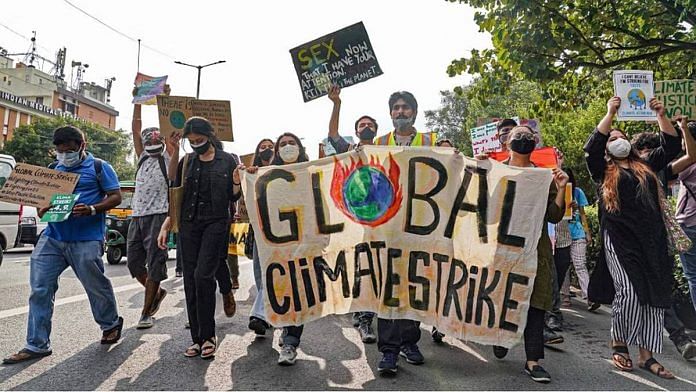The world stands on a crossroads regarding fighting the multiple challenges confronting humanity, the most pressing one being climate change. But the impacts of climate change vary greatly between countries and population groups. This climate crisis is a deeply unfair one, with the poor being disproportionately affected. The countries with the fewest resources are likely to bear the greatest burden in terms of loss of life and relative effect on investment and the economy.
The World Bank reports that only one-tenth of the world’s greenhouse gases are emitted by 74 lowest income countries, but they will be most affected by the effects of climate change. Compared to the 1980s, they have already experienced approximately eight times as many natural disasters in the past 10 years. By 2050, unchecked climate change might force more than 200 million people to migrate within their own countries, pushing up to 130 million people into poverty and unravelling decades of hard-won development achievements.
1. Health
The climate crisis severely jeopardizes the realization of universal health coverage (UHC) in various ways, including by compounding the existing burden of disease and by exacerbating existing barriers to accessing health services, often at the times when they are most needed. Globally, warming of 2-3°C might result in more than 150 million additional cases of malaria worldwide, or a 5% increase in the number of people at risk. Increased water shortages would have an impact on water quality and cleanliness, and diarrhoea would become more common. By 2030, it is predicted that there will be 48,000 more diarrhoea-related deaths in children under the age of 15.
2. Hunger
Poor people will be impacted by changes in food production, higher consumption prices and changes in rural incomes as a consequence of impacts on agricultural productivity and prices driven up by either gradual changes in long-term climate trends or more frequent and severe natural disasters. The probability of crop yield failures is projected to be as much as 4.5 times higher by 2030 and up to 25 times higher by 2050 across global breadbaskets. The crop yield losses could mean that food prices would be 12% higher on average in sub-Saharan Africa.
3. Water scarcity
Access to water is becoming threatened by climate change. Frequent droughts, increased evaporation and changes in rainfall patterns and run-off particularly impact water availability in areas like the sub-tropics, which already experience water scarcity. By 2025, there will be 5 billion people on the planet, up from the current 1.7 billion who will be affected by water scarcity.
4. Education
Many families will survive economic downturns brought on by decimated crops through counter-productive means such as pulling their children out of school to save on fees and/or putting them to work to make up for lost income.
5. Creating refugees
Climate change is a powerful driver of internal migration because of its impacts on people’s livelihoods and loss of liveability in highly exposed locations. By 2050, 216 million climate refugees will have been displaced in six world regions, with the top three being in sub-Saharan Africa (86 million), East Asia and the Pacific (49 million), South Asia (40 million).
6. Work-related hazards
Excessive heat during work creates occupational health risks; it restricts a worker’s physical functions and capabilities, work capacity and productivity. Heat stress is projected to reduce total working hours worldwide by 2.2% and global GDP by $2.4 billion in 2030.
Ending poverty and fighting climate change cannot be done in isolation – the two will be much more easily achieved if they are addressed together in the poorest countries. Developing countries have a window of opportunity to build resilience and reduce short-term climate change impacts on poverty through development policies that are inclusive and climate-informed. This is particularly true for investments that involve high immediate costs, but are urgently needed to prevent lock-ins into carbon-intensive patterns, such as for urban transport, energy infrastructure or deforestation.
Solutions do exist. In particular, the structural transformation of rural economies should be speeded up so that fewer agricultural workers are exposed to high temperatures, and less physical effort has to be expended in such conditions. Other important policy measures that can help are skills development, the promotion of an enabling environment for sustainable enterprises, public investment in infrastructure, and improved integration of developing countries into global trade.
Domestic resources may be insufficient to put in place such measures, and international support will be essential. The international community can help poor and vulnerable countries adapt by providing financial support and developing institutional capacity.
However, the threats to development and the eradication of poverty will only mount over time if there are no mitigation measures. This means that nations must take immediate action to cut their emissions using two strategies:
-
Pay close attention to ways to reduce emissions that have positive effects on health, the economy, or development, such as using mini-grids and renewable energy sources in isolated rural areas or changing to energy-efficient lightbulbs and appliances.
-
Protect the poor by enhancing social protection and cash transfers, which may be paid for by energy taxes or the elimination of fossil-fuel subsidies.
This article was originally published in the World Economic Forum.
Also read: Adaptation too slow, COP27 must address loss and damage caused by climate change, says UN



